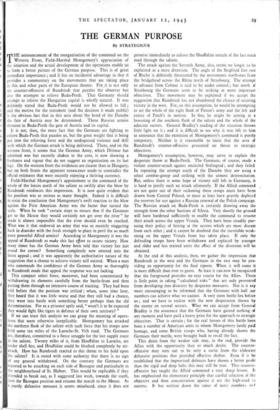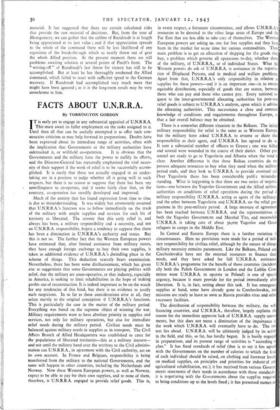THE GERMAN PURPOSE
By STRATEGICUS It is not, then, the mere fact that the Germans are fighting to relieve Buda-Pesch that puzzles us; but the great weight that is being put into the relieving force and the undisguised violence and skill with which the German attack is being delivered. There, and on the western front, it seems that the German Army, which Dittmar has admitted was but recently shaken to the core, is now showing a freshness and vigour that do not suggest an organisation on its last legs. On the western front the evidences are clearer than in Hungary; but on both fronts the apparent renascence tends- to'contradict the official estimates that were recently enjoying a thriving currency.
Field-Marshal Montgomery's appointment to the command of the whole of the forces north of the salient so swiftly after the blow by Rundstedt reinforces this impression. It is now quite evident that the position was as serious as many thought. Indeed it is difficult to resist the conclusion that Montgomery's swift reaction to the blow against the First American Army was the factor that turned the scale. When he took " certain steps to ensure that if the Germans got to the Meuse they would certainly not get over the river" he made it almost impossible that the river should even be reached. What was it that endowed an army that was so recently staggering back in disorder with the fresh strength to place in peril the so much more powerful Allied armies? According to Montgomery it was the appeal of Rundstedt to make this last effort to secure victory. How many times has the German Army been told that victory lies just round the corner? • Something completely new entered into the latest appeal ; and it was apparently the authoritative nature of the suggestion that a chance to achieve victory still existed. When a man who commands the confidence of the German Army so thoroughly as Rundstedt made that appeal the response was not lacking.
This compact select force, moreover, had been concentrated by withdrawing its elements carefully from the battle-front and then putting them through an intensive course of training. They had been told before that the position was critical; when, some time later, they heard that it was little worse and that they still had a chance, they went into battle with something better perhaps than the old determination. For as a prisoner aptly said, " wasn't it to be expected they would fight like tigers in defence of their own territory? "
If we can trust this analysis we can grasp the meaning of opera- tions that seem otherwise inexplicable. Montgomery has attacked the northern flank of the salient with such force that his troops now hold some ten miles of the Laroche-St. Vith road. The Germans are, therefore, committed to a fierce struggle for the last supply route in the salient. Twenty miles of it, from Houffalize to Laroche, are under shell fire,' and Houffalize could be blocked completely by air- attack How has Rundstedt reacted to this threat to his hold upon the salient? It is stated with some authority that there is no sign of any general withdrawal. On the contrary the Germans are reported to be attacking on each side of Bastogne and particularly in the neighbourhood of St. Hubert. This would be explicable if they intended to break out, as I suggested, last week, towards the south, turn the Bastogne position and resume the march to the Meuse. As a purely defensive measure it seems misplaced, since it does not promise immediately to relieve the Houffalize stretch of the last main road through the salient.
The attack against the Seventh Army, also, seems no longer to be explained as a mere diversion. The angle of the Siegfried line east of Bitche is definitely threatened by the movements north-east from the bridgehead across the Rhine north of Strasbourg. The attempt to advance from Colmar is said to be under control ; but north if Strasbourg the Germans seem to be striking at more important objectives. This movement may be explained if we accept the suggestion that Rundstedt has not abandoned the chance of securing victory in the west. For, on this assumption, he would be attempting to set the whole of the right flank of Patton's army and the left and centre of Patch's in motion. In fine, he might be aiming at a loosening of the southern flank of the salient and the whole of the adjacent sectors. General Bradley's reading of the situation throws little light on it ; and it is difficult to see why it was left to him to announce that the extension of Montgomery's command is purely temporary. Neither is it reasonable to insist that the area of Rundstedt's counter-offensive presented no threat to strategic Objectives.
Montgomery's assumption, however, may serve to explain the desperate throw at Buda-Perth. The Germans, of course, made a violent counter-attack against encircled Stalingrad ; and they failed. In repeating the attempt south of the Danube they are using a select combat-group and striking with the utmost determination. But, unless there is some hope of victory still left in Germany, it is hard to justify such an attack ultimately. If the Allied command are not quite out of their reckoning these troops must have been drawn from Central Poland, or must at least have gravely depleted the reserves for use against a Russian renewal of the Polish campaign. The Russian attack on Buda-Perth is certainly drawing away the strength from the other bastions of Silesia. Very shortly the ground will have hardened sufficiently to enable the command to resume their attack across the upper Vistula. They have been steadily pur- suing their policy of hitting at the sectors which arc most distant from each other ; and it cannot be doubted that the inevitable weak- ening on the upper Vistula front has taken place. If only the defending troops have been withdrawn and replaced by younger and older and less trained units the effect of the diversion will be obtained.
At the end of this analysis, then, we gather the impression that Rundstedt in the west and the Germans in the east may be pro- viding an opportunity for the final riposte. When it will come It is more difficfilt than ever to guess. At least it can now be recognised that the foreground provides no easy course for the Allies. There is little point in taking " calculated risks " that are only prevented from developing into disasters by desperate measures. Nor is it any more encouraging to be informed that the Germans with half our numbers can achieve what we cannot. A very stern battle lies before us ; and we have to reckon with the new desperation shown by the enemy on several sectors. What we can accept from General Bradley is the assurance that the Germans have gained nothing of any moment and have paid a heavy price for the approach to strategic objectives. That is certain ; for the real heroes of this battle have been a number of American units to whom Montgomery justly paid homage, and some British troops who, having already shown the Germans their mettle, were brought back to recall the fact.
This drain from the weaker side may, in the end, provide the Allies with the opportunity they so much desire. The counter- offensive may turn out to be only a sortie from the elaborate defensive positions that provided effective shelter. Even if it be established that the improvised defences have shown a better profit than the rigid and deep belts this may still be true. This counter- offensive has taught the Allied command a very sharp lesson. It has emphasised the elementary principle that careful selection of the objective and then concentration against it are the high-road to success. It has written down the value of mere numbers an material. It has suggested that there are certain calculated risks that provide the raw material of decisions. But, from the tone of Montgomery, we can gather that the calibre of Rundstedt is at length being appreciated at its just value ; and if that appreciation spreads to the whole of the command there will be less likelihood of any repetition of the break-through which so nearly threw out of gear the whole Allied position. At the present moment there are still problems awaiting solution at several points of Patch's front. The " writing-off " of Rundstedt's last throw-for victory has still to be accomplished. But at least he has thoroughly awakened the Allied command, which failed to react with sufficient speed to the German recovery. If Rundstedt had accomplished very much more that might have been ignored ; as it is the long-term result may be very unwelcome to him.























 Previous page
Previous page